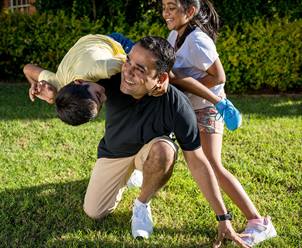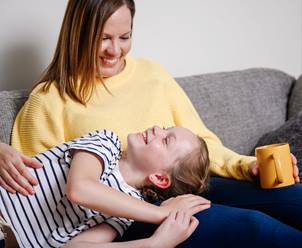The death of a loved one can be extremely tough on kids. Here are some ways to help children process their loss to ensure they’re grieving properly.
The death of a loved one can be extremely tough on kids. But there are ways to help children process their loss to ensure they’re grieving properly.
When a loved one dies, children show and feel their grief in different ways. It’s important, though, that children feel safe to feel the way they need to feel and to process their emotions. There are, of course, ways you can help your children get through the trauma of losing someone close to them. There are also things you can do to help them along the way.
Talk to them honestly
Most children are aware of death, even if they may not understand it. In fact, many cartoons and kids’ shows actually deal with death in a way that children can relate to. But experiencing grief first-hand can be confusing and very upsetting.
The important thing to remember is that you need to be honest with the kids without volunteering too much information. Speak in age-appropriate terms and be direct. Kids are literal, so if you use euphemisms like ‘mummy is in the clouds now’ or ‘grandpa went to sleep’, they can become quite afraid and also quite upset when mummy doesn’t come back from the clouds or grandpa doesn’t wake up.
Create some mementos for them
Just because a loved one is gone, doesn’t mean they’ll be forgotten. Children relate to physical things, so having something that reminds them of the person they’ve lost can help them manage their emotions. If death is expected, a nice idea may be to write letters to the child that they can open when they get older.
Another way to help them remember is a photobook of the person’s story. Who they were, when they were born, photos of them when they were young and then growing up. Of course, include photos of your child with the relative so there is a visual clue. You can even write memories alongside the photos for your child to read.
When clearing out closets, take a piece of clothing from the lost loved one and create a pillow, a bear or a blanket. This gives your child something physical to hold and a blanket can even help comfort them—like a warm hug.
Show your own grief
Kids model behaviour so if you are sharing your own grief in a healthy way, they know it’s ok to do so too. Don’t hide your emotions from them. Crying alongside your child shows them that it’s ok to express themselves.
At the same time, show your child that it’s ok to smile and laugh. There’s no right or wrong way to grieve and the same goes for your child. They need to know that it’s ok to laugh, even though everyone around them may be sad.
Put protections in place
The death of a loved one, especially a parent, can be very disruptive for a child. A whole piece of their world is now gone and it can cause a lot of emotional trauma. It’s important that these emotions are dealt with, otherwise they can bottle up and cause long-term issues.
The last thing family members want to think about is covering everyday expenses. Putting insurance protections in place, such as Life Insurance, could provide a safety net for the family, so you can focus on your grief and your children can continue to live their lives as normally as possible.
While making plans for the loss of a loved one is difficult to talk about, having the tough conversations now will help make things easier in the long run for your loved ones. Insuranceline is here to make it easier. If you need assistance setting up your Life Insurance plan, contact Insuranceline on 13 77 87 or get an online quote.
Important information
Cover under the Funeral Insurance Benefit is for Accidental Death only for the first 12 months of cover, including for any increases. Accidental Death has a special meaning in the PDS and some causes of death are excluded during this time—please refer to the PDS or call us for further details. After the first 12 months, the Funeral Insurance Benefit provides cover for all causes of death.




